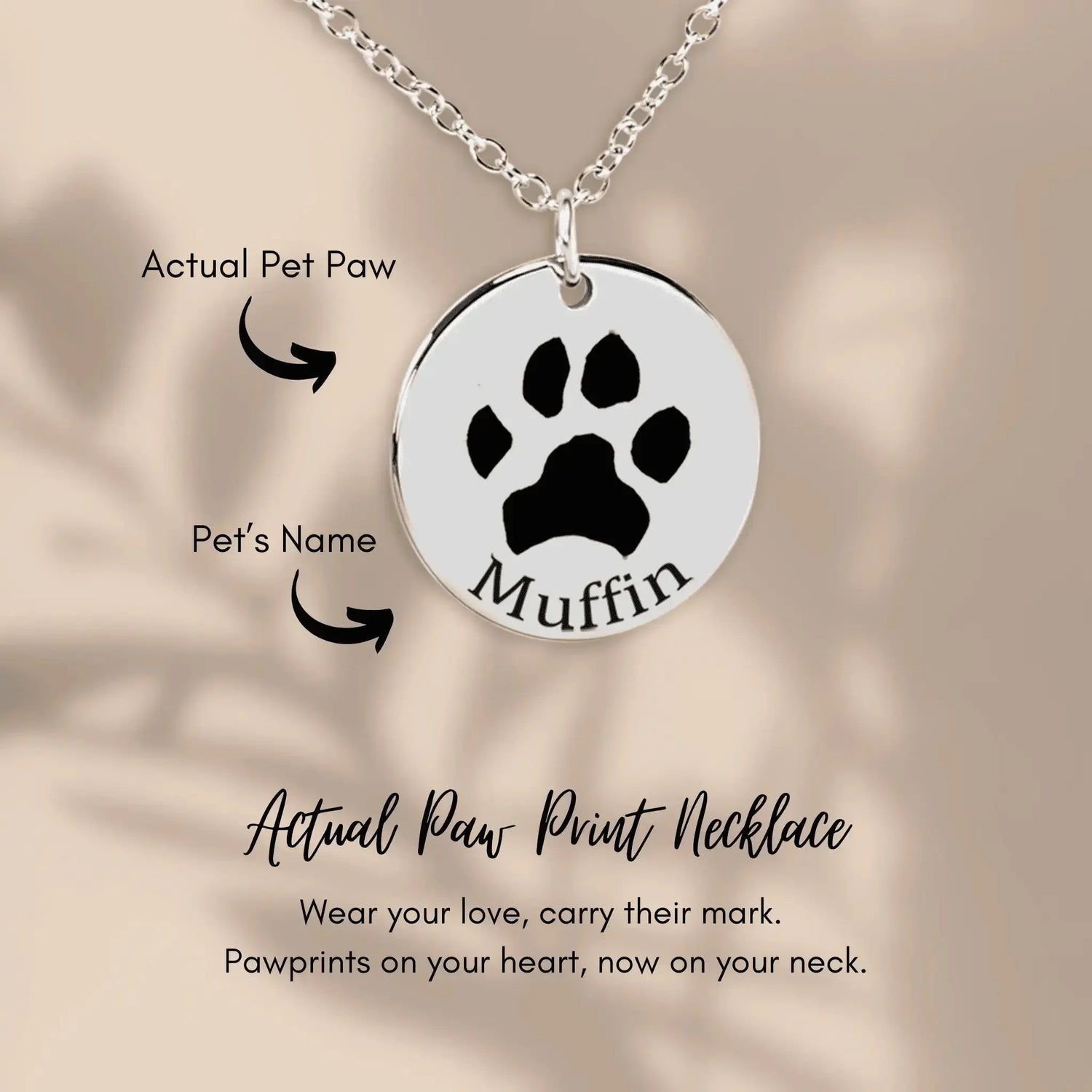Why Is My Kitten Meowing So Much?
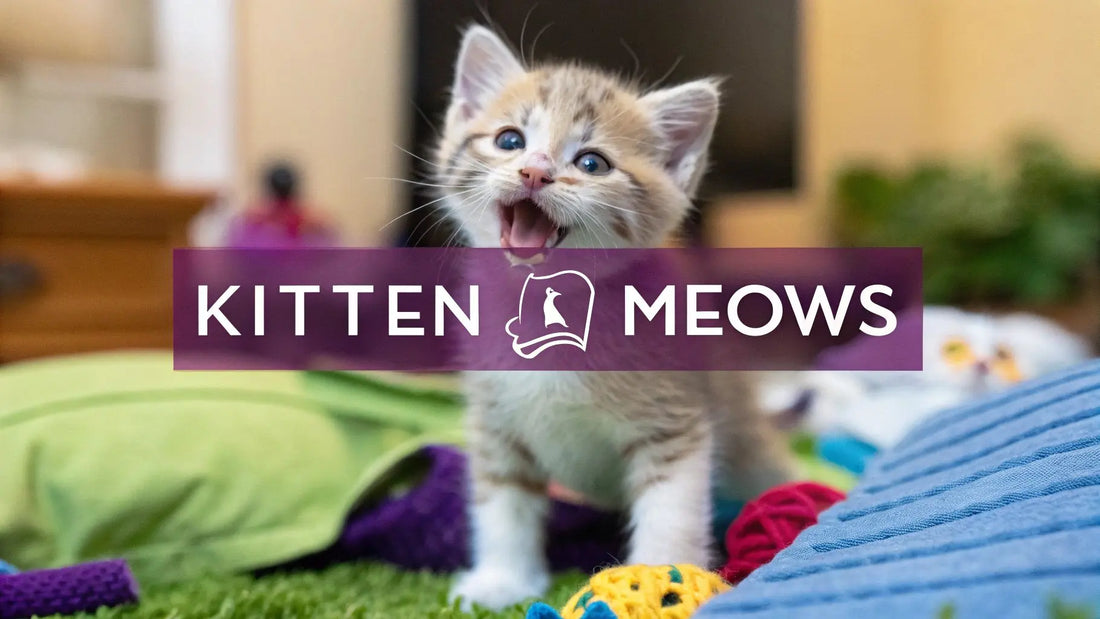
Ever wonder, "why is my kitten meowing so much?" 🤔 It's not just random noise—it's your new little furball trying to talk to you! Those tiny sounds are your kitten’s primary tool for communicating everything from an empty tummy to a plea for playtime.
Our mascot, Floofie, knows that every meow is a message waiting to be decoded. 😻 Let's get this paw-ty started!
Your Kitten Is Talking Let's Decode the Meows
Welcome to the wonderfully noisy world of kitten parenthood! If you're hearing a constant chorus of mews, you’re definitely not alone. The best way to think about it is that you're learning a new language: Kitten-ese. Every little chirp and insistent meow is a piece of a puzzle, and figuring it out is how you build that incredible bond with your new best friend.
The truth is, cats are incredibly smart communicators. Kittens initially meow to get attention and milk from their mothers. But as they grow up, that behavior shifts into a special language reserved almost exclusively for their hoomans. Studies have shown that adult domestic cats meow far more often than feral cats do, proving they’ve learned this is the most effective way to get our attention. They're basically training us! So clever! ✨
The Most Common Kitten Conversations
So, what exactly is your tiny tiger trying to say? While we'll dive deeper into specific meow sounds later, most of their chatter boils down to a few key requests. Understanding these basics is the first step to becoming a true meow-master.
Here are the top reasons your kitten is trying to get your attention:
- "I'm hungry, hooman!" 🥣: This is, without a doubt, the number one reason for meows. A kitten's tummy is tiny and needs frequent refueling, so a cute but demanding meow around mealtime is their clear way of saying, "Fill 'er up!"
- "Play with me! Please?" 🐭: Kittens have boundless energy just waiting to be unleashed. If they're feeling bored, they'll meow to try and get you to start a game. Grab a fun toy, like an interactive feather wand, to turn those meows into happy purrs.
- "I'm feeling a little lonely." 😿: Your kitten has left its mom and siblings and now looks to you for comfort and security. A soft, plaintive meow might just be a call for a reassuring cuddle or a gentle pat.
- "Hey, where did you go?" 🧐: If you walk into another room and leave your kitten behind, they might meow to keep track of you. It’s their way of doing a little roll call, saying, "I'm still here, are you?"
To make things even clearer, here's a quick cheat sheet for decoding those tiny cries.
Top 5 Reasons Your Kitten Is Meowing
| Reason 🐾 | What It Means 🤔 | Floofie's Quick Tip ✨ |
|---|---|---|
| Hunger/Thirst | Their food or water bowl is empty, and they're politely (or not-so-politely) reminding you. | Stick to a consistent feeding schedule so they know when to expect their next meal. |
| Boredom | They have pent-up energy and want you to initiate playtime. A bored kitten is a mischievous kitten! | Rotate their toys and schedule a few 5-10 minute play sessions throughout the day. |
| Loneliness | They're seeking comfort, affection, or just want to know you're nearby. | A few minutes of petting or letting them nap on your lap can make a world of difference. |
| Greeting | A short, happy chirp when you walk in the room is their version of saying, "Hello! I missed you!" | Greet them back! Talk to them in a soft, happy voice to reinforce your bond. |
| Discomfort | A sudden increase in meowing, or a pained-sounding cry, could signal they're not feeling well. | If their meows change suddenly or are paired with other symptoms, it's time for a vet check-up. |
Remember, every kitten is a unique little individual, but these reasons cover the vast majority of meows you'll hear.
Floofie’s Tip: Responding to your kitten's meows with gentle words and actions teaches them that they can trust you. It builds a foundation of love and security that will last their entire life! ❤️
Being a new pet parent can feel overwhelming at times, but remember that every little "meow" is a chance to learn more about each other. For more guidance on this amazing journey, check out our helpful guide for first-time cat owners for tips and tricks to make the transition smooth for both of you.
The Secret Language of Kitten Meows
Alright, let's get down to the fun part—cracking the code! Not all meows are created equal. In fact, your little furball has a surprisingly diverse vocabulary, and learning to interpret it is like unlocking a secret level of friendship.
Think of your kitten's meow as a finely tuned instrument. The pitch, length, and volume all combine to create a specific message intended just for you. A quick, high-pitched chirp is worlds away from a long, drawn-out "meooooow," and understanding the difference is key to becoming the best cat paw-rent you can be.
Decoding Different Meow Frequencies
Just like our voices change with emotion, a kitten's meow shifts based on what they're feeling or asking for. It’s their way of adding emphasis, urgency, or affection to their requests. Listening closely to these little variations will tell you a lot about your kitten’s emotional state.
This visual guide breaks down the core reasons behind your kitten's meows, connecting their cries to their most common needs.
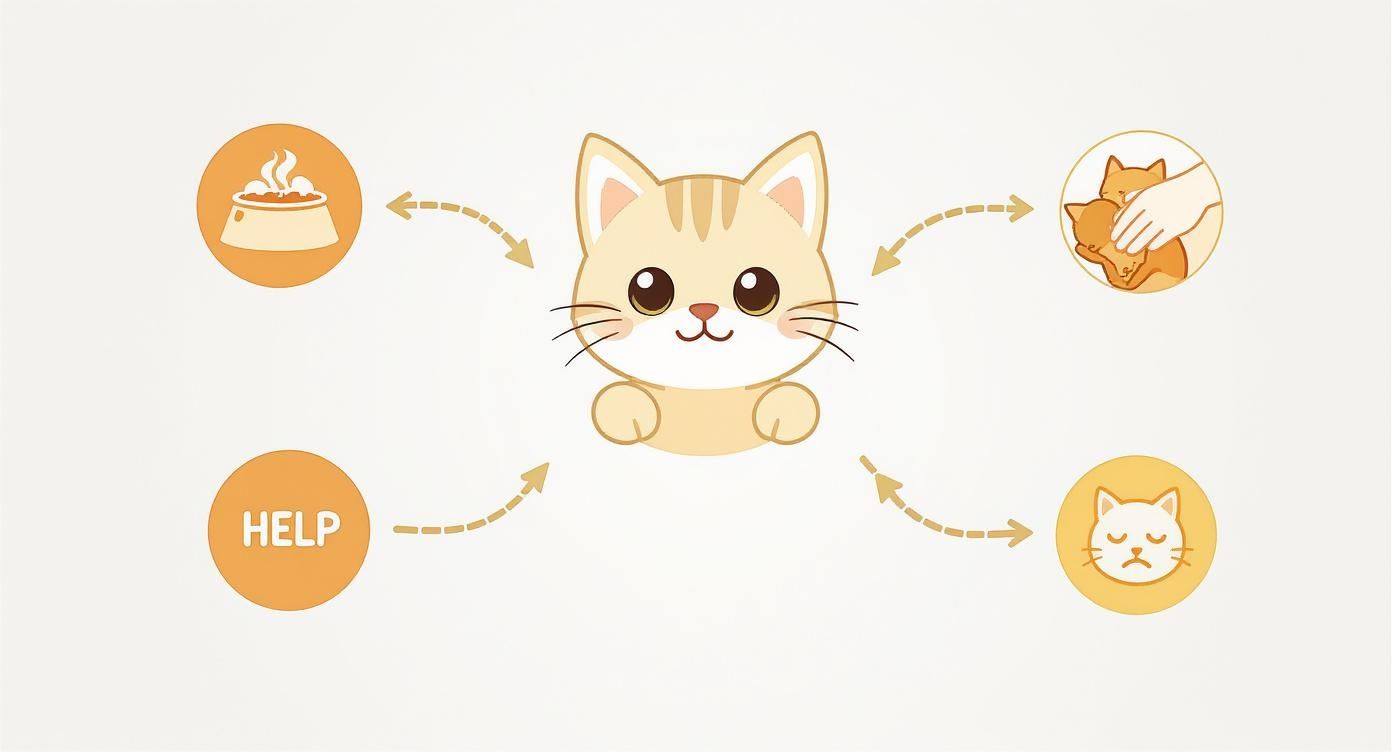
As you can see, hunger, the need for attention, and calls for help are the big three drivers behind their little vocalizations.
Common Meows and What They Mean
Let's translate some of the most common sounds you'll hear from your tiny companion.
- Short, High-Pitched Mew: This is the classic, "Hey! Look at me!" sound. It’s often just a friendly greeting or a polite request for a little attention. Think of it as the kitten equivalent of a happy little wave. 👋
- Multiple Mews in a Row: If your kitten unleashes a series of quick meows, it's a sure sign of excitement! They're probably thrilled to see you and are saying, "You're home! I missed you! Let's play!"
- Long, Drawn-Out Meow: Now this is a more demanding meow. Your kitten has a specific need and isn't afraid to let you know about it. This is the "Feed me right MEOW!" or "My favorite toy is stuck under the couch!" cry for help.
- Low-Pitched, Growl-Like Meow: This sound is one of complaint or annoyance. Maybe another pet is bothering them, or you're doing something they don't like. It’s their way of setting a firm boundary.
Floofie’s Tip: Pay attention to what’s happening when your kitten meows. The context is everything! A meow by the door means something very different than a meow by their empty food bowl.
The incredible thing is that we're naturally wired to pick up on these cues. The frequency and tone of a kitten's meow provide valuable insights into its emotional state. Research has even shown that humans are surprisingly good at interpreting different cat vocalizations, like telling the difference between a meow for food and one from being left alone. You can discover more insights about cat vocalization research and how our feline friends have perfected their communication with us.
Beyond the Meow: Other Kitten Sounds
Your kitten's soundboard has more than just meows! Keep an ear out for these other adorable and informative noises.
- Purring: This is the ultimate sign of contentment. That deep, rumbling purr usually means your kitten is happy, relaxed, and feeling safe. Sometimes, they also purr to self-soothe when they're nervous, much like we might hum a tune to ourselves.
- Chirping or Trilling: These sweet, bird-like sounds are often used by mother cats to call their kittens. Your furball might chirp at you to get your attention or to encourage you to follow them somewhere—probably to the kitchen!
- Hissing or Spitting: These are unmistakable warnings. A hiss means your kitten is scared, angry, or feels threatened. Give them space and remove the source of their stress if you can. It's their fierce little dragon impression! 🐲
Learning this language takes a little time, but it’s one of the most rewarding parts of having a kitten. Every meow, purr, and chirp strengthens your bond. And hey, you’ll be a certified Kitten-ese translator in no time.
Exploring the Top Reasons Kittens Meow
So, you're getting the hang of the different tones in Kitten-ese. Now, let's play detective and connect those sounds to what's actually causing them. Why is your little furball meowing in the first place? It almost always comes down to a specific need or feeling they're trying to get across.
Figuring out the "why" behind the meow is a bit like solving a puzzle. Your kitten gives you all the pieces—the type of meow, their body language, what's happening around them—and you get the satisfying job of putting it all together. Once you start spotting the patterns, you’ll be able to meet their needs before they even have to ask.
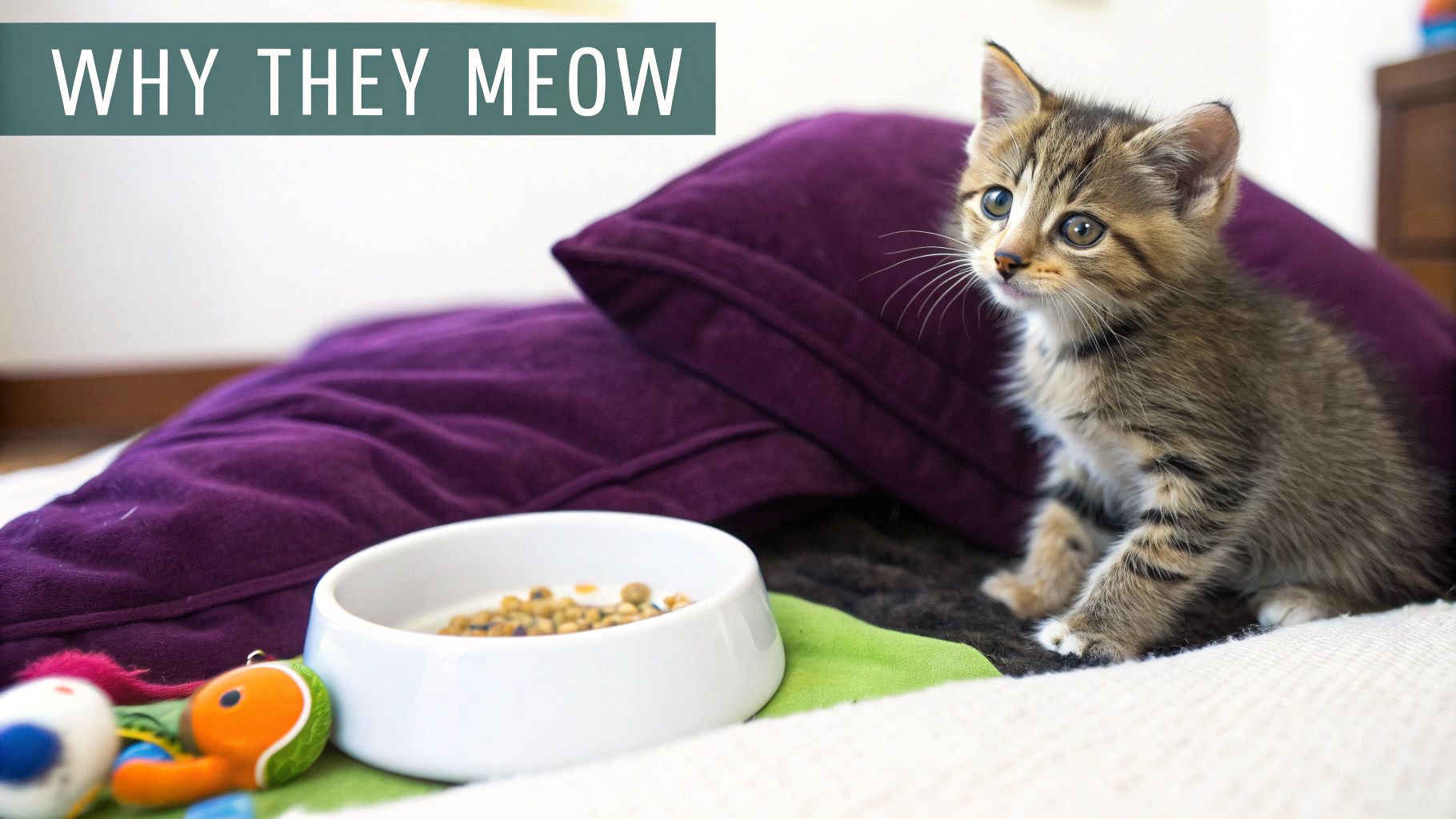
The "My Tummy is Rumbling" Meow
This is, without a doubt, the number one reason for a kitten concert. Kittens have tiny stomachs and burn through energy like tiny little racecars, which means they need small, frequent meals all day long. If you hear insistent meows around feeding time (or really, anytime you walk near their food bowl), that’s a pretty clear signal their internal dinner bell is ringing loud and clear. 🔔
Don't forget about thirst, either. A fresh, clean bowl of water is absolutely essential for your kitten’s health. If their water bowl is looking a little low or grimy, they might meow to let you know they need a refill. This is especially true if they're on a dry food diet, which can make them extra thirsty.
The "I'm So Bored!" Meow
A bored kitten is a vocal kitten! These little fluffballs are just bursting with natural predator instincts that need an outlet. If they've had a good nap and a full belly, their next mission is simple: playtime. A meow aimed right at you while they're batting at your shoelaces or doing zoomies around the living room is a direct invitation to play.
Without enough to do, kittens can become tiny agents of chaos. Their meows are a plea to engage their minds and bodies, and this is where interactive toys become your absolute best friend.
Floofie’s Pick: “To keep my little brain sharp, I absolutely adore puzzle feeders! They make mealtime a super fun game. Check out the best puzzle toys for cats, they're the purr-fect way to bust boredom and give your kitten a tasty reward for their smarts!”
Engaging your kitten with toys doesn't just quiet the "I'm bored" meows; it also helps stop them from developing destructive habits. For more awesome ideas, check out our guide to the best puzzle toys for cats that will keep your tiny genius entertained.
The "I Need Some Comfort" Meow
For a tiny kitten, leaving their mom and siblings is a massive change. Your home is a whole new world, and it can feel big, strange, and a little bit scary at first. Loneliness and stress are very real for them, and their meows are often a call for a little reassurance.
A soft, sad-sounding mew when they can't find you or when they wake up all alone is their way of saying, "I'm feeling a bit lost, I need a cuddle." They're looking to you as their new source of safety and comfort. Responding with gentle pets and a soft voice reinforces the message that they are safe and loved in their new home.
Creating a secure space that’s all their own can also work wonders. A cozy, enclosed cat cave bed gives them a personal sanctuary where they can retreat when they feel overwhelmed. Think of it as their own personal fortress of solitude.
How to Respond to Your Kitten's Meows
So, you've cracked the code and translated the meow—go you! 🎉 But what comes next? Responding is the most important part. How you react to your kitten’s little calls is a huge piece of building your bond and teaching them how to communicate effectively (and, you know, politely!).
When you respond the right way, you're showing your kitten they are heard, loved, and safe. It turns their meows into a positive conversation instead of just background noise. Think of it as rewarding their A+ communication skills! Our mascot, Floofie, is here to help you become a master responder.
Your Go-To Kitten Meow Checklist
When your tiny fluffball starts a meow-a-thon, it can be tempting to just scoop them up for a cuddle. And while that’s never a bad idea, running through a quick mental checklist first helps you address what they actually need. It makes you a super-efficient problem-solver.
Here's a simple process to follow the next time you hear a persistent meow:
- Check the Food and Water Bowls: This is always stop number one. Is their food bowl empty? Is their water fresh and clean? A hungry or thirsty kitten is a very vocal kitten! 💧
- Inspect the Litter Box: Honestly, a dirty litter box is a top-tier reason for complaints. Cats are incredibly clean animals, and if their bathroom isn't up to their high standards, they will absolutely let you know about it. For more on this, our expert guide on how to litter train a kitten can help you establish perfect bathroom habits.
- Initiate Playtime: If their basic needs are met, your kitten is probably just bored. They're asking for interaction and fun! A simple "play with me!" meow is their way of saying they have energy to burn.
This simple three-step check solves the mystery behind "why is my kitten meowing" about 90% of the time. It’s a fast and effective way to get right to the heart of what they need.
Smart Responses to Demanding Meows
Sometimes, your kitten's meows can feel a bit... demanding. 😼 Maybe they start crying for food an hour before dinner or wail for attention while you're trying to work. The key here is to respond without accidentally rewarding that demanding behavior.
If your kitten is constantly meowing for food, avoid giving in to their every cry. Instead, stick to a consistent feeding schedule. This teaches them that food arrives at specific times, not just whenever they meow the loudest. Their internal clock will adjust, and the demanding meows will eventually fade.
For those attention-seeking meows, the best strategy is redirection.
Floofie’s Top Tip: “When I want attention, nothing works better than a super fun toy! Instead of just picking me up, my human will grab my favorite Floofie-Approved Feather Wand. It shows me that they hear me, but it channels my energy into a fun game we can play together!”
The Power of Play and Positive Reinforcement
Play is one of the most powerful tools you have. It’s not just about having fun; it’s a way to redirect energy, satisfy their natural hunting instincts, and make your bond even stronger. When your kitten meows out of sheer boredom, jumping into a play session is the perfect response.
Here are some of Floofie's favorite boredom-busting products:
- Interactive Feather Wand: A classic for a reason! Dangle a Floofie-Approved Feather Wand to mimic a bird or bug, and watch your kitten's hunting instincts kick right in. This is a fantastic way to bond and burn off all that kitten energy.
- Laser Pointer: The elusive red dot provides endless entertainment. Just be sure to end the session by letting them "catch" a physical toy to avoid any frustration.
- Catnip-Filled Mice: These little toys are perfect for solo play. The catnip will get them excited, and they can bat, pounce, and "hunt" to their heart's content. 🐭
By responding thoughtfully, you're not just quieting the noise. You’re building a language of trust and creating a happy, stimulating home where your kitten feels understood, safe, and deeply loved.
When a Meow Might Mean More
Most of the time, your kitten’s little mews are just their charming way of asking for dinner, playtime, or a good cuddle session. It’s part of their language. But as their favorite hooman, it’s also crucial to know when a meow might be more than a simple request. Sometimes, a shift in their vocalizations is their only way to wave a tiny red flag and tell you something isn't quite right.
You're the world's leading expert on your kitten's unique personality and sounds. Seriously. Learning their normal "chatter" is your superpower! This knowledge helps you instantly pick up on when a meow sounds off—maybe it's harsher, happening way more often, or sounds desperate. It’s this change from their baseline that often serves as the first clue.
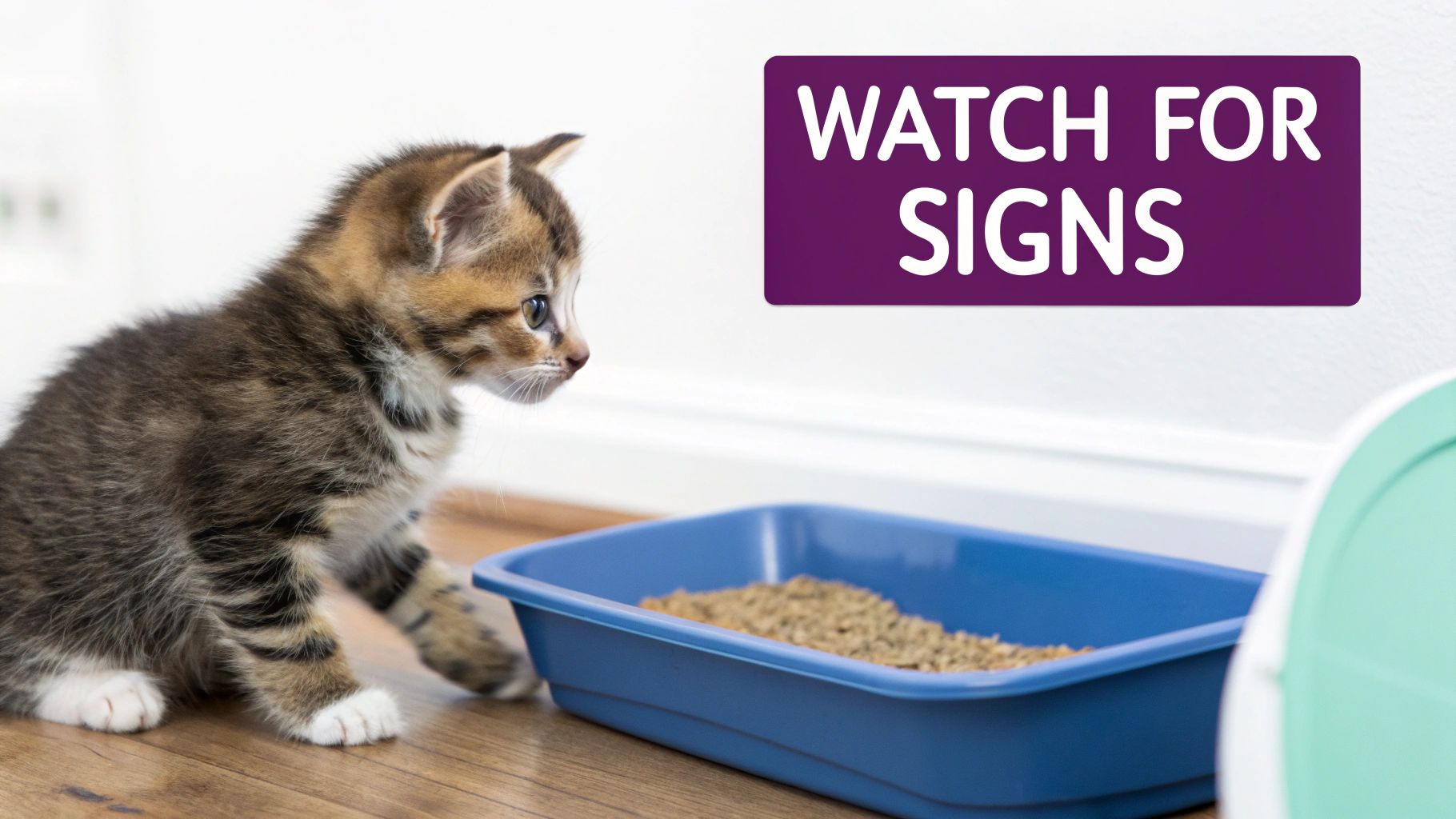
Recognizing Meows That Need a Closer Look
While most meows are completely harmless, certain vocalizations should make you pause and pay closer attention. This doesn't mean you need to panic, but it does mean it's time to put on your detective hat and observe your tiny friend a bit more carefully. 🕵️♀️
Here are a few signs that a meow might be a cry for help:
- Excessive and Unstoppable Meowing: If your kitten suddenly starts meowing nonstop and you've already run through the usual checklist (food, water, clean litter box, playtime), it could be a sign of distress.
- Meowing in Strange Places: A kitten crying out while in the litter box is a major warning sign. This behavior is often linked to urinary tract infections (UTIs) or other bladder issues, which are painful and need a vet’s attention right away.
- A Sudden Change in Sound: Has your kitten’s sweet mew turned into a pained-sounding yowl or a weak, raspy cry? This could indicate they are in pain or feeling really unwell.
- Meowing Paired with Other Symptoms: Vocalizations that come with other red flags like lethargy, hiding, changes in appetite, or vomiting should always be taken seriously.
Floofie’s Gentle Reminder: “My humans know my happy chirps from my ‘something’s not right’ mews. If I ever sound really off, they know it’s time to call the nice doctor. When in doubt, a vet check-up is the most loving thing you can do!”
Common Health Issues Behind Concerned Meows
Understanding what could be wrong helps you connect the dots a lot faster. A pained meow is your kitten’s only way to tell you something hurts, so tuning in is key.
For example, a kitten who meows with a pained tone every time they try to jump onto their favorite cozy cat tower might have a sore paw or a little muscle strain. It’s these contextual clues that help you narrow down the problem.
Here are a few common health-related reasons for problem meowing:
- Pain or Injury: From a tiny thorn in their paw pad to internal discomfort, pain is a primary reason for a sudden spike in meowing. Your kitten can't point to where it hurts, so they cry out for help instead.
- Urinary Tract Problems: As mentioned, meowing in the litter box is a huge red flag. UTIs can be incredibly painful and, if left untreated, can become very serious, especially for male kittens.
- Gastrointestinal Upset: An upset tummy, constipation, or other digestive issues can definitely cause your kitten to meow from discomfort.
- Feeling Overwhelmed or Scared: While not a physical illness, severe anxiety can cause constant meowing. A big change in their environment or a frightening experience could be the culprit. A calming cat cave bed can offer a safe retreat for a stressed-out kitty. 💖
Ultimately, you know your furbaby best. A sudden, dramatic shift in their meowing habits is always worth a call to your veterinarian. It will give you peace of mind and ensure your tiny companion gets the care they need to stay happy, healthy, and joyfully meowing for all the right reasons.
Your Questions About Kitten Meowing Answered
Still scratching your head over your kitten's constant chatter? Don't worry, it's a common puzzle for new cat parents! Our little mascot, Floofie, has heard just about every meow-related mystery there is. We've put together this little Q&A to help clear things up. 🧐
Let's dive into some of the trickiest situations and get you and your tiny friend speaking the same language, even if it's 3 AM.
Why Does My Kitten Meow So Much at Night?
Ah, the midnight meow-athon. It’s a classic! Kittens are naturally crepuscular, which is just a fancy way of saying they're most energetic at dawn and dusk. That internal alarm clock can make them feel extra playful and chatty right when you’re trying to catch some Zs. 🌙
Most of the time, they're meowing because they're bored, a bit hungry, or feeling a little lonely in the dark. The house gets quiet, and that little meow is just their way of asking, "Hey, you still there?"
To help quiet the nighttime chorus, give these a try:
- Tire Them Out: A solid, energetic play session right before bed is a game-changer. Just 15 minutes of intense chasing with a feather wand can burn off that last burst of kitten energy.
- Offer a Late-Night Snack: A small meal or a few treats tucked into a puzzle toy can prevent hunger from waking them up. It also gives their brain something to do!
- Create a Cozy Haven: Make sure their sleeping spot is warm, safe, and irresistible. A soft, welcoming plush cat bed can give them the security they need to settle down.
Consistency is everything here. Stick with it, and your kitten will eventually learn to sync up with your sleep schedule.
How Can I Stop My Kitten From Meowing for Attention?
It's actually a wonderful sign that your kitten wants your attention—it means they love you! But when the meows become nonstop demands, it's time to gently redirect that energy. The goal isn't to ignore them, but to teach them a more polite way to ask.
Completely ignoring them can sometimes make them even more anxious. A better approach is to wait for a tiny pause in the meowing—even just a second of silence—and then shower them with praise and pets. This teaches them a powerful lesson: quiet gets the cuddles.
Floofie’s Golden Rule: “My human taught me that quiet time gets the best cuddles! If I'm being too loud, they'll wait for me to take a breath, and then the fun begins. It's our little secret handshake!” 🐾
The best long-term strategy is to be proactive. Try to anticipate their need for attention by scheduling a few dedicated play sessions throughout the day. This keeps their "attention cup" full and reduces their need to meow for a refill.
Will My Kitten Grow Out of Meowing So Much?
That's a great question, and the answer is a little bit of yes and a little bit of no. As kittens get older, those tiny, helpless-sounding meows will naturally fade away. They become more confident and independent, so they won't need to cry for reassurance quite as often.
However, the meowing they direct at you is a learned behavior. Adult cats almost exclusively meow to communicate with humans, not other cats. So, how much they "talk" as an adult really depends on how you've responded to them. If you’ve shown them that meowing leads to fun, playtime, and affection, you’ll likely have a chatty companion for life!
Some breeds, like Siamese or Bengals, are also just naturally more vocal. But for the most part, a chatty kitten is a sign of a strong, interactive bond. So go ahead and embrace your little conversationalist!
At FloofChonk, we believe understanding your cat is the first step to a beautiful friendship. From cozy beds that soothe anxiety to interactive toys that bust boredom, we have everything you need to keep your tiny tiger happy, healthy, and purring. Explore our full collection of Floofie-approved products today! https://www.floofchonk.com
